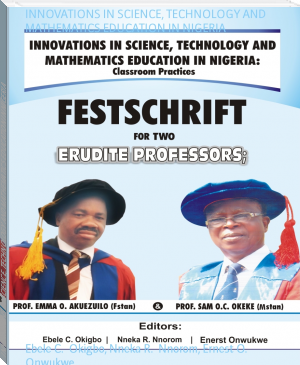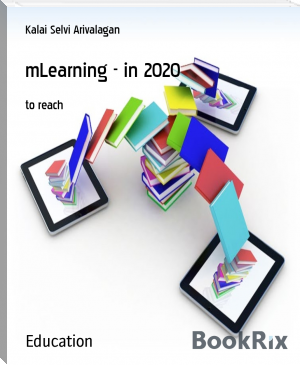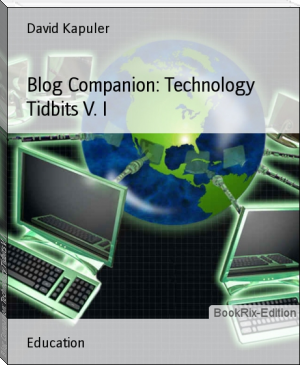INNOVATIONS IN SCIENCE, TECHNOLOGY AND MATHEMATICS EDUCATION IN NIGERIA - Ebele C. Okigbo, Nneka R. Nnorom, Ernest O. Onwukwe (best novel books to read TXT) 📗

- Author: Ebele C. Okigbo, Nneka R. Nnorom, Ernest O. Onwukwe
Book online «INNOVATIONS IN SCIENCE, TECHNOLOGY AND MATHEMATICS EDUCATION IN NIGERIA - Ebele C. Okigbo, Nneka R. Nnorom, Ernest O. Onwukwe (best novel books to read TXT) 📗». Author Ebele C. Okigbo, Nneka R. Nnorom, Ernest O. Onwukwe
Pascarella, E. T;Pierson, C.T; Wolniak, G.C & Terezil, A. S. (2003). First generation college students: additional evidence on college experiences and outcome. Journal of higher education, 231- 242.
Rauner, D. M. (2000).They still pick me up when I fall. New York N. Y: Columbia university press.
Ravitch, D. (2007). Edspeak: A glossary of educational terms, phrases, buzzwords and jargon. A lexanderia, V. A. association for supervision and curriculum development.
Rhodes, J. E. (2002). Stand by me, the risks and rewards of mentoring today’s youth. Cambridge, M. A.: Harvard university press.
Robert, A. (2000). Mentoring revisited: A phenomenological reading of the literature. Mentoring and tutoring, 8, 145-168.
Santos, S. J. & Reigadas, E. T. (2002). Latinos in higher education: An evaluation of a university faculty mentoring program. Journal of Hispanic higher education, 210-215
Schlosse, L. Z; Knox, S.;Moskovitz, A. R. & Hill, C. E. (2003). A qualitative study of the graduate advising relationship: the advisee perspective. Journal of counselling psychology, 50,178-188.
Surn, A; Park, K.K. & Chunks, R. E. (2010).Impact of coaching on the academic performance of students in public schools in Boston. Article on mentoring/research support non-U.S. Government.
Tinto, V. (2003).Dropout from higher education. Theoretical synthesis of recent research, review of educational research.
Vogt, C. M. (2008).Faculty as a critical juncture in student retention and performance in engineering programs. Journal of engineering education, 25-35
Wikipedia, (2010).https://en.m.wikipedia.org/wiki/mentorship.
World Bank, (2005). Expanding opportunities and building competences: A new agenda for education, Washington DC: World Bank
SECTION FIVE
ENTREPRENEURSHIP SKILLS FOR SUSTAINABLE DEVELOPMENT IN SCIENCE, TECHNOLOGY AND MATHEMATICS EDUCATION
INNOVATIONS IN CLASSROOM PRACTICES IN SCIENCE TEACHING FOR SUSTAINABLE DEVELOPMENT
Dr. N.N.C. Samuel
Abstract
The paper examined the innovations in classroom practices in science teaching for sustainable development. Various areas open to innovations in education were discussed such as innovation in: curriculum structure, methodology, teaching and learning environment, instructional material usage and assessment of learning outcomes. The importance of classroom practices was highlighted and the implication of innovation for the teacher was buttressed. The paper advocates that feedback on the progress of the students should be monitored and possible modifications made when necessary. Diagnosis of students’ interest and ability that would foster creativity should be made early, channeling and teaching the students with innovations that will embrace sustainability.
Keywords: Innovations, Classroom Practices, Science Teaching, Sustainable Development.
Introduction
Science is taught in schools for a variety of reasons which justify its inclusion in the school curriculum. The term science has been defined by different scholars in different ways: According to Mbah (2006) science is the systematic study of natural phenomena together with the application. Science has also been defined as the process by which we increase and refine the understanding of ourselves and the universe through continuous observation, experiments, application and verifications. Science according to Wehmeier (2010) is the knowledge about the structure and behaviour of the natural and physical world based on fact that one can prove. It is an intellectual activity through which man seem to understand nature. Science is also the knowledge arranged in an orderly manner especially knowledge obtained by observation and testing. It is a process or method for finding out or discovering our world.
Science is both a body of knowledge and a process for gaining more knowledge about the world in which we live. Since science represents a vast body of knowledge, it is impossible for any individual to know everything about science. The reasons for teaching science are distinguished between factors which are directly related to science itself, explaining its inherent values and those which emphasize the instrumental role of science. These reasons are classified as the intrinsic and extrinsic justifications of science teaching. The intrinsic justification of science teaching lays emphasis on the nature of science and not on the role of science in the society. It portrays education through science, involving motivation to explore the natural world, processes of science, and making empirical judgment. The extrinsic justification of science teaching emphasizes the role of science in the society and its utilitarian value in the area of scientific literacy, economic advancement and science as a vocation.
Science can be defined in terms of its products, its methods and its motives or ethical rules (Urevbu,1990).In terms of its products, knowledge in the form of concepts, facts, laws and theories are considered while defining science in terms of its methods, how scientific knowledge comes into being is focused. Defining science in terms of its motives or ethical rules, the emphasis is on the scientific attitudes of scientists which employs them to perform their tasks in ways to communicate their findings as efficiently as possible and will not mislead their fellows. In his definition of science, Urevbu stated that science is considered asan enterprise participated by human beings concerned with the study and parsimonious explanation of the materials and forces of nature. In teaching science therefore, variety of techniques should be employed, desire to know must be motivated in the learner. This assumes an orderliness in nature which is governed by understandable and acceptable ethical principles that terminates incredible concepts in form of comparatives and quantitative concepts. Science as a body of knowledge has major branches like mathematics, physics, chemistry, biology, astronomy and numerous sub-branches and fields like bio-chemistry, meta-physics, and geography among others. These branches can be studied as distinct disciplines.
The study of any discipline or branch of science follows a systematic pattern called scientific methods. In using scientific methods, Scientists are very alert and inquisitive. They use their senses to observe what is happening around them. They detect from their observations the problem which they try to solve by firstly putting forward a hypothesis and then carryout appropriate experiment to testit (Ababio, 2013).The major concern of science is to explore and interpret the natural world through the fundamental disciplines of science. Biology is concerned with the study of living matter, chemistry is the study of matter, its properties, reactions, and the changes they undergo, and physics deals with the energy and general properties of matter. Human beings particularly have been interested to understand and control the natural world in which he lives. This is where the processes of science emanate, providing empirical evidence for generating a conceptual framework, which can potentially enable us to make sound judgments in non-scientific areas.
Science provides the avenue for effective harnessing and utilization of the resources of any country for national development. Scientific literacy is the development of scientific and technological attitude, approaches and skills which are necessary to cope with rapidly changing environment and which are useful for problem solving and decision making in daily life. The FRN (2004) in the National policy on education recognizes that education is the greatest investment a nation can make for the quick development of her economic, political, sociological and human resources. This implies that the primary education lays foundation for scientific and effective thinking and the secondary education builds on this to enhance the post basic education and career development while tertiary education promotes effective acquisition of functional skills and competencies necessary for self-reliance (FRN,2013). For effective teaching and learning to take place in the science classroom, the teacher is expected to communicate effectively and utilize appropriate innovative teaching strategies help the students to attain maximum achievement in their learning tasks. This study therefore, discussed the innovative approaches to teaching as a panacea for effective teaching and learning of science subjects in Nigerian secondary schools.
Innovations in science teaching
Innovation is defined as new ways of doing things. According to Naccino-Brown, Oke and Brown (1982), innovation refers to creative ways which the learner is transformed from a passive receiver of knowledge into an active creator of the process in which he learns. Though the concept of innovation is relative in that what is innovative to one person or others may be common to another person, 21st century teaching and learning of science needs a paradigm shift from teacher- centered to student-centered teaching and learning. There is need for innovation in order to catch up with the current development in technology globally. The kind of innovation needed requires a sustainable change in how science is taught. Every time there are changes or developments happening around the world, the school curricula are affected. There is a need to update them to address the society’s needs. The federal government of Nigeria has been on the fore front to adapting to change in the curricula of the three levels of education. The advent of the new 9,3,4 system of education called for the development of new curriculum in every subject area both in the junior and senior secondary levels of education. Innovation therefore will involve the following areas in science education: Innovation in curriculum structure, innovation in methodology, innovation in the teaching and learning environment, innovation in instructional material usage and innovations in assessment of learning outcomes.
Innovation in curriculum structure
Curriculum is the aggregate of courses of study given in a school, college, university, etc. Curriculum development is defined as planned, a purposeful, progressive, and systematic process to create positive improvements in the educational system (Alvior, 2014). Curriculum development has a broad scope because it is not only about the school, the learners, and the teachers. It is also about the development of society in general. In today’s knowledge economy, curriculum development plays a vital role in improving the economy of a country. It also provides answers or solutions to the world’s pressing conditions and problems, such as environment, politics, socio-economics, and other issues of poverty, climate change, and sustainable development. There must be a chain of developmental process to develop a society. First, the school curriculum, particularly in higher education, must be developed to preserve the country’s national identity and to ensure its economy’s growth and stability. The curriculum well designed for sustainable development of a nation would be subject-centered, learner-centered, and problem-centered design. The curriculum of a subject should revolve around such subject and related to the larger society. Science subjects: biology, chemistry and physics curriculum must be related to everyday life activities not just in school but in the society. A sustainable society must have her foundation in her schools. The knowledge use of the learner should be focused on in designing the curriculum. What the learner ought to know at his age and apply in future would be the fulcrum for designing the curriculum. The Nigerian National Science Curriculum for senior secondary schools adopted spiral and concentric approach to teaching concepts through the use of guided discovery method. This was to ensure that learning takes place during experimentation, exploration and discussion. The issue of curriculum in science in Nigeria has been a controversial one because though in place, there has never been a yardstick by which the design is measured. No one has reported officially whether the curriculum meets the objectives for which it is designed for.
Innovations in methodology
Teaching science to primary and secondary school students, centers around the questions: what do we teach and how do we teach it. These questions do not relate only the content but also the method of instruction. Whatever content that should be taught to the students is as important as the method/technique adopted to it. Gone are the days when science was taught the memorization and repetitions while content is chosen on the basis of how well it would discipline and exercise the mind. The call to teach science contents with various methods that involve hands-on and minds-on activities and experiments has been the focus of researchers. The techniques which has been reported by researchers that had improved the teaching and learning of science are as follows: hands-on activities, role play, storytelling, sports based learning, visual clues, instructional conversations, science text cards, word games, graphic organizers, word parts, social media, visual science labs, wall words, thinking maps, mini anchor charts, crossover learning, argue with science, context based learning, computational learning, remote labs, embodied learning, science museums, projects, multimedia approach, ICT enabled learning, video clips, power points, mini-labs, science fair, research books, documented problem solving, science kit, science stations, observation stations, peer to peer teaching, science movies, science games for





Comments (0)